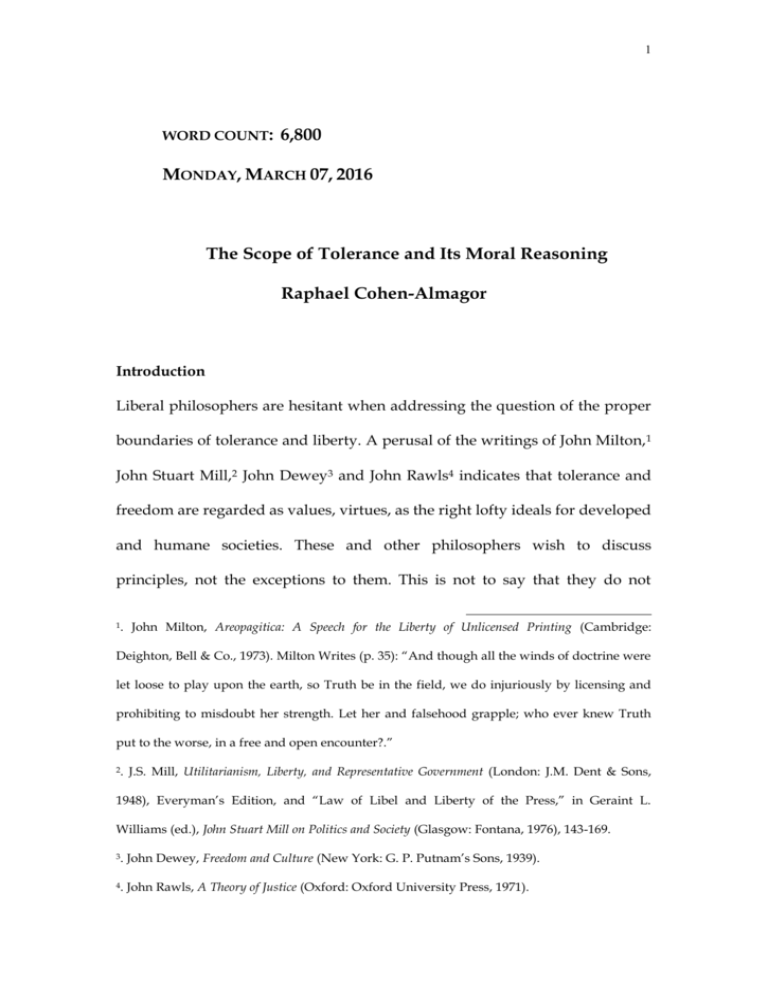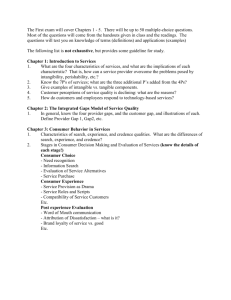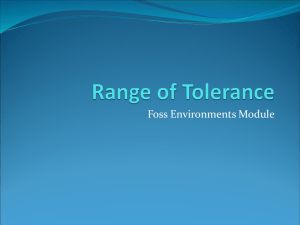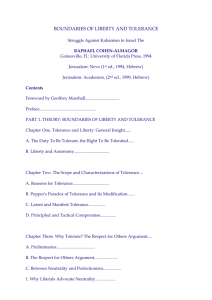Scope of Tolerance and Its Moral Reasoning
advertisement

1 WORD COUNT: 6,800 MONDAY, MARCH 07, 2016 The Scope of Tolerance and Its Moral Reasoning Raphael Cohen-Almagor Introduction Liberal philosophers are hesitant when addressing the question of the proper boundaries of tolerance and liberty. A perusal of the writings of John Milton,1 John Stuart Mill,2 John Dewey3 and John Rawls4 indicates that tolerance and freedom are regarded as values, virtues, as the right lofty ideals for developed and humane societies. These and other philosophers wish to discuss principles, not the exceptions to them. This is not to say that they do not 1. John Milton, Areopagitica: A Speech for the Liberty of Unlicensed Printing (Cambridge: Deighton, Bell & Co., 1973). Milton Writes (p. 35): “And though all the winds of doctrine were let loose to play upon the earth, so Truth be in the field, we do injuriously by licensing and prohibiting to misdoubt her strength. Let her and falsehood grapple; who ever knew Truth put to the worse, in a free and open encounter?.” 2. J.S. Mill, Utilitarianism, Liberty, and Representative Government (London: J.M. Dent & Sons, 1948), Everyman’s Edition, and “Law of Libel and Liberty of the Press,” in Geraint L. Williams (ed.), John Stuart Mill on Politics and Society (Glasgow: Fontana, 1976), 143-169. 3. John Dewey, Freedom and Culture (New York: G. P. Putnam’s Sons, 1939). 4. John Rawls, A Theory of Justice (Oxford: Oxford University Press, 1971). 2 acknowledge the need to place limits on tolerance and freedom; but usually their discussion is devoted to the placement of principles and these are, in the context of democracy, tolerance and freedom. Relatively little attention is paid to the clarification of the exceptions to the principles and to the outlining of boundaries. Several explanations can be suggested to explain this tendency, some are time bound or specific to a historical-cultural context; others are more general in nature, touching upon the roots of liberal outlook. Among all philosophers, John Stuart Mill is most associated with the themes of tolerance and liberty. On Liberty, published in 1859, is probably quoted more than any other writing in praise of freedom and tolerance. A careful examination of the book shows that it deals with the boundaries to these principles in a rather hasty manner, two or three times throughout the book, when one of the limitations is mentioned only in a footnote. The most well known limitation relates to incitement statements and is illustrated by a short discussion about an excited mob gathering outside the corn dealer’s home: … even opinions lose their immunity when the circumstances in which they are expressed are such as to constitute their expression a positive instigation to some mischievous act. An opinion that corn-dealers are starvers of the poor, or that private property is robbery, ought to be unmolested when simply circulated through the press, but may justly incur punishment when delivered orally 3 to an excited mob assembled before the house of a corn-dealer, or when handed about among the same mob in the form of a placard.5 In the footnote Mill writes that it is not the concern of On Liberty to discuss the question of whether a doctrine that allows the murder of a tyrant is moral. However he holds that “the instigation to it, in a specific case, may be a proper subject of punishment, but only if an overt act has followed, and at least a probable connection can be established between the act and the instigation.”6 Thus, we do not find in Mill’s writing a systematic discussion of the boundaries to free expression. Instead, Mill provides ad hoc proposals as solutions to special cases. Mill lived in an era in which it was customary to write in a decisive style. Writers expressed their opinions in a self-confident manner without the hair splitting and meticulousness engaged in today. The thinking was that for the ideas to be understood correctly they must be presented in an acute and clear language. More specifically in regard to Mill, he was an elitist who did not much trust the masses. He doubted their ability to understand complex messages and asked that the people understand the general principles. To this end, it was first and foremost necessary to generate the principles. Once these are absorbed and understood it will be possible to discuss the exceptions to the principles. This is why there is an emphasis in 5. 6. John Stuart Mill, Utilitarianism, Liberty, and Representative Government, p. 114. John Stuart Mill, Utilitarianism, Liberty, and Representative Government, p. 78. For further discussion, see R. Cohen-Almagor, The Boundaries of Liberty and Tolerance (Gainesville, Fl.: University Press of Florida, 1994), chapter 7. 4 his writings on the principles of tolerance and freedom and the exceptions to them appear so seldom. In his Autobiography, Mill described On Liberty as a philosophical essay containing one truth.7 In the Introduction to On Liberty Mill describes that truth as being embodied in one single principle. The masses (or rather, even the masses) could understand one single principle. Notice the language he adopts: The object if this Essay is to assert one very simple principle, as entitled to govern absolutely the dealings of society with the individual in the way of compulsion and control, whether the means used be physical force in the form of legal penalties, or the moral coercion of public opinion. That principle is, that the sole end for which mankind are warranted, individually or collectively, in interfering with the liberty of action of any of their number, is self-protection…8 Indeed, one who reads Mill’s books cannot avoid the feeling that the number “one” is Mill’s favorite. This language that is intended to emphasize one principle repeats itself in an early article in which Mill seeks to anchor freedom of expression. In the article “Law of Libel and Liberty of the Press” he writes: 7. J. S. Mill, Autobiography (Oxford: Oxford University Press, 1971), at 150. 8. John Stuart Mill, Utilitarianism, Liberty, and Representative Government, pp. 72-73 (emphasis mine, RCA.). 5 There is one case, and only one, in which there might appear to be some doubt of the propriety of permitting the truth to be told without reserve. This is when the truth, without being of any advantage to the public, is calculated to give annoyance to private individuals.9 It does not matter that Mill actually thought that there was more than one principle for restricting the search for truth, as I show elsewhere. 10 What was important is to emphasize that restrictions are absolutely exceptional. In most cases people should adhere to the Free Speech Principle, in service of truth. Jeremy Bentham and Mill’s father, James Mill, who molded John Stuart’s thinking to a great extent, also adopted a similar language that emphasized a single principle. They suggested an understanding of governments’ actions by focusing on one simple principle: people will always act in accordance with their interests and, of all interests, the utilitarian interest rules supreme. People wish to increase gains, to enrich happiness and to decrease pain.11 9. J. S. Mill, “Law of Libel and Liberty of the Press,” in Geraint L. Williams (ed.), John Stuart Mill on Politics and Society, 160-161 (emphasis mine, RCA.). 10. R. Cohen-Almagor, “Why Tolerate? Reflections on the Millian Truth Principle,” Philosophia, Vol. 25, Nos. 1-4 (1997): 131-152. 11. For further discussion, see Charles W. Everett, Jeremy Bentham (London: Weidenfeld & Nicolson, 1966); H.L.A. Hart, Essays on Bentham (Oxford: Clarendon Press, 1982); John Dinwiddy, Bentham (Oxford: Oxford University Press, 1989); R. Cohen-Almagor, “Ends and Means in J. S. Mill’s On Liberty,” The Anglo-American L. Rev., Vol. 26, No. 2 (1997): 141-174. 6 In the 20th century it was John Rawls who influenced liberal philosophy more than any other philosopher. His book, A Theory of Justice, is considered by many as one of the few books that will earn a prominent place in the philosophical literature and be remembered along with the writings of John Locke, Immanuel Kant and John Stuart Mill. I discuss the Rawlsian treatment of tolerating the intolerant in chapter 7. Here let me say briefly that Rawls dedicated only six pages to the discussion on boundaries to tolerance and liberty, which do not do justice to this intricate topic.12 In those pages Rawls forsakes the detailed principled conception that guides the discussion on the foundations of a just society. Rawls pursues a line of argument that avoids addressing why must we act with tolerance toward those that are intolerant as long as they do not pose a risk to our existence?13 It seems that what unites liberal philosophers on this issue is the fear of sliding down the slippery slope, namely that deciding on exceptions to the principles of tolerance and liberty might open the door to further exceptions. Indeed, setting boundaries is not easy. The task is difficult and sisyphean, requiring us to define the exceptions narrowly without opening the door for different interpretations. Furthermore, any proposed restriction is bound to be controversial, because liberals are united in their opinion about the importance of tolerance and liberty but there is no consensus about the exceptions to those principles. One who proposes a certain restriction to 12. John Rawls, A Theory of Justice, at 216-221. 13. See also Arthur Fish, “Hate Promotion and Freedom of Expression,” Canadian Journal of Law and Jurisprudence, Vol. 2, No. 2 (1989): 111-137, esp. at 136-137. 7 tolerance and liberty might be considered illiberal by others claiming that the restriction is too sweeping, too dangerous. Therefore liberals are often reluctant to address this ungrateful task. Also, liberals are lacking confidence as to the right course of action. The democratic phenomenon as we know it today is relatively young and therefore suffers from inherent deficiencies. Modern democracy was crystallized only after World War I.14 From a historical perspective, democracy is merely an infant. It lacks the experience of dealing with those who wish to exploit tolerance and liberty to bring the destruction of democracy. Democracy is conceived in positively charged terms, as the preferred form of governance. When a concept is elevated to a value, a positive thing that is an ideal for humanitarian and advanced societies, as in the works of John Dewey and other philosophers, it is very difficult to set limits to it. 15 Liberals feel uncomfortable with the task of setting boundaries because of the sincere desire to be as democratic and liberal as possible, to show that democracy tolerates everything, or almost everything, and that in this it is different from other forms of governing. The problem is that many liberals do not acknowledge that democracy is not essentially different from other governing forms in one critical characteristic: any form of governing is 14. Cf. James Bryce, Modern Democracies (London: Macmillan, 1921), Vol. I, at 4. 15. John Dewey, Freedom and Culture, esp. at 127. See also Peter Nicholson, “Toleration as a Moral Ideal,” in J. Horton and S. Mendus (eds.), Aspects of Toleration (New York: Methuen, 1985): 158-173. 8 characterized by the fact that the foundations that make it up are also those that can bring about its destruction. This is easy and clear to comprehend when we deal with governing forms that are based on coercion. When capable, the depressed people will try to break free from their chains. This rationale -- that the foundations that underlie the system are also those that can bring about its destruction -- is true for democracy as well. Democracy that is based on tolerance without proper boundaries endangers its existence. Freedom is not lawlessness and tolerance is not anarchy. We must prescribe the foundations of democracy. We must acknowledge “the democratic catch,” that the underlying principles of the system might endanger it and bring about its destruction.16 Tolerance, of course, is not to be equated with indifference. Tolerance is composed of three main components: (1) a strong disapproving attitude toward a certain conduct, action or speech; (2) power or authority to curtail the disturbing conduct, and (3) moral overriding principles which sway the doer not to exert his or her power or authority to curtail the said conduct. From this formulation it is clear that tolerance cannot be considered as indifference, for the doer does have strong reservations regarding the conduct. He or she cares greatly about the issue but nevertheless applies self-restraint. Tolerance could not also be equated with the concept of neutrality because in 16. For further discussion, see R. Cohen-Almagor, Boundaries of Liberty and Tolerance, esp. pp. 3, 80; Speech, Media, and Ethics: The Limits of Free Expression (Houndmills and New York: Palgrave, 2001), esp. pp. xv, 16, and also idem (ed.), Liberal Democracy and the Limits of Tolerance (Ann Arbor, MI: University of Michigan Press, 2000), pp. 1-2. 9 the contemporary liberal thinking neutrality is perceived as a specific requirement of justice and, in this respect, its meaning is akin to that of impartiality. As stated, tolerance, on the other hand, assumes that the agents are very partial regarding the phenomenon they consider. I now turn to discuss the moral grounds of tolerance and then provide a distinction between two forms of tolerance: latent and manifest. Moral Overriding Principles I see it crucial to speak of moral overriding principles as distinct from general overriding principles. Let me explain the difference by considering two examples: Ronny is notoriously unpunctual. Every appointment that he makes is qualified by the remark, “I’ll be there on time, give or take half an hour; what's half an hour among friends?”. Now Ronny has a relatively new girl friend, Sasha. As ever Ronny was late for their previous meetings and found that, unlike his other friends, Sasha strongly resented his behaviour and qualifications. She wants to see him on time, period. She has also warned him that she will break off with him if he comes late to their next meeting. Ronny is on his way to meet Sasha. He departs his home early, quite certain that this time Sasha will be happy. He is going to be in Sasha’s place earlier than expected. Then Sasha will realize that the relationships mean a great deal to him. On his way he passes through the park and he sees two teenagers attacking a girl, stripping her clothes and about to rape her. Ronny has grave reservations about rape; he detests such a violent, gross behaviour. 10 Moreover, he is a big lad, in a perfect shape, and with powerful arms. He knows that he could subdue those two teenagers if he embarked on a fight with them. However, he also knows that it will take him some time to subdue them, and consequently he will be late, yet again, for his date. Sasha has clearly told him that she has no interest in hearing further apologies, explanations and excuses, however perfectly logical and convincing these might be. She will not tolerate any late arrival. Ronny continues on his walk and allows the rape. The second example has to do with the decision of the anti-Nazi allies not to bomb Auschwiencim. In 1944 the allies knew what was going on in the extermination camps; they knew the exact location of the camps, and had the bombers to bomb the railroads. Nevertheless, they failed to do it because they used their bombers for other purposes; because they did not want to kill civilians and victims of the Nazis, or for other reasons deemed to be substantial. The question before us is the following: Could we say that Ronny, in the first example, and the allies in the second, were tolerant toward the detestable conduct in question? If we do then we imply two things: that the term “tolerance” is not value loaded and could be used with regard to what is conceived to be a negative behavior; and that any overriding considerations will do to characterize not putting into effect authority or power to forestall a most detestable conduct. To my mind, this usage of the term “tolerance” in these examples and in any like context is unconvincing. I think toleration has to involve only 11 positive connotations. We cannot be said to tolerate something because of any reason that comes to mind. Ronny and the decision makers in the allies’ headquarters cannot be said to behave indifferently because Ronny had strong feelings against rape, and the allies presumably had strong feelings against mass murder. Ronny was not tolerant because in addition the overriding principle, which he employed - not to be late to his date - was not moral. Rather it was a partisan, egoistic, convenient consideration that served him better. I tend to think the same about the allies’ policy during the Second World War not to bomb the Nazi death camps. Both Ronny and the allies did not tolerate transgressions against humans: they were simply preoccupied with other matters.17 That is to say that the overriding considerations that are applied by the tolerators should be directly connected to the phenomena that outrage them. Actors can be said to behave in a tolerant fashion only when they apply moral considerations that are relevant to the detested phenomena, convincing them to exhibit restraint. In the above examples, restraint was the result of lack of action but the behavior was repugnant. 17 . For further deliberation about the concept of tolerance, see the following excellent collections: John Horton and Susan Mendus (eds.), Aspects of Toleration (New York: Methuen, 1985); Susan Mendus and David Edwards (eds.), On Toleration (Oxford: Clarendon Press, 1987); Susan Mendus (ed.), Justifying Toleration (Cambridge, England: Cambridge University Press, 1988). See also Susan Mendus, Toleration and the Limits of Liberalism (London: Macmillan, 1989). For discussion of tolerance between people, see Michael Walzer, On Toleration (New Haven and London: Yale University Press, 1997). 12 The following section offers a distinction that conceives tolerance as a matter of personal attitude, as well as of institutions and laws. I discern different levels of latent and manifest tolerance in accordance with the efforts the tolerator invests in performing acts of toleration. This distinction is concerned with different ways in which tolerance exhibits itself and explains the scope of tolerance. Before I begin the analysis, a note on terminology is in order. The term “latent” is used to convey the notion of something hidden, as opposed to open and expressed. Both forms of tolerance, the manifest as well as the latent, are understood to be intentionally exercised by conscious agents. I argue that degrees of manifest tolerance can be distinguished, and that the latent form of tolerance is significant, although it is not expressed openly. Latent tolerance is significant to the tolerator, and to the overall notion of toleration that is upheld in society.18 Latent and Manifest Tolerance I have contended that tolerance is composed of a disapproving attitude and one or more principles, which override that disapproval. The disapproval may be latent or manifest. If it is manifest, it can take several forms, ranging from a lenient attitude to manifest strong disapproval. The lenient attitude, in relation to freedom of expression, urges that every idea should be heard as long as it does not coerce other people, and hence that every manifest form of disapproval should not abridge the right to free speech in any way. The 18 . The following discussion draws upon chapter 2 of my book The Boundaries of Liberty and Tolerance. 13 manifest strong disapproval involves objections to an opinion but nevertheless believes in its right to be heard. A very lenient view argues that respect for others requires respect for everyone, whoever they may be, as well as respect for any opinion a person may wish to hold, however distasteful it may be. Every opinion has the right to compete with other opinions, alongside our disapproval. A less lenient attitude might convey counter-arguments or deeds designed to fight the disapproved opinion and persuade the public to take sides against the disliked views. Disapproval also may take the form of manifest protest against these views, usually after any hope of trying to influence the agent to moderate his or her conduct has been lost. Yet the overriding principles restrict the freedom of the tolerator to exercise suppression, with the result that the tolerated are allowed to continue carrying out their actions or conveying their beliefs. Let us examine this range of attitudes in detail. In the first instance, during a debate we may think there is a point in trying to change the other’s mind by exchanging views. As tolerators we are willing to face the other person, whose ideas or behavior we strongly resent; nevertheless, we respect the other’s right to hold and preach them. We even may come to a debate determined to convince the other and simultaneously not be averse to changing our views. Attitudes of this sort afford tolerance of opponents in the belief that they are free to speak out their opinions, and that they may be right. Condescension is not at work in such instances, nor is opportunism or indifference. This sort of tolerance is distinct from indifference because the agent does care about the other’s conduct and 14 preferences. Indeed, this is the real essence and meaning of the idea of tolerance and it may be entitled strong manifest tolerance. A weaker manifest tolerance occurs when we are willing to confront the other but come with a different purpose in mind. Sometimes we may be willing to take part in a public debate not so much to influence the other participants (the gap between the views might be too wide and unbridgeable) as to influence the audience, in the hope of scoring more points than our opponent. A still weaker form of manifest tolerance is when we tolerate the conduct of others, but are not willing to negotiate with them or do anything which might help the others convey their views. Thus, on some occasions, we may tolerate an opinion but not be willing to share the same platform with our opponent, or put ourselves in any other way in what may be regarded as an equal position to the other, for fear that so doing might legitimize the other’s views. Another means of seeking to withhold another’s views of legitimization is by walking out of the room whenever unpopular views are being expressed. For instance, in early October 2001, the Russian politician Vladimir Zhirinovsky came to a NATO meeting in Ottawa, and began his inflammatory remarks by denying any involvement of anyone other than the USA in the terrorist raid of 11 September 2001, claiming that the Americans bombed their own World Trade Centre and the Pentagon in order to have a reason for their imperialist globalization policies. He also claimed that without a doubt it was Israel that brought down the Tupolov airplane of the 15 Siberian Airlines over the Black Sea on 4th of October. Seventy-eight passengers and crew, most of them Israeli Russians, were killed in this tragedy. The Ukrainian government admitted that they mistakenly brought down the plane by firing a missile during military training. Zhirinovsky, however, said that Israel caused this tragedy for political gains. Were I present in the audience I would have walked out. Zhirinovsky does not deserve an attentive audience when making such unfounded allegations. Whether these forms of action can still be considered as acts of tolerance may be reasonably questioned. It may be argued that they cannot, since such a practice is incompatible with the activity of rational debate or discussion, and that a way of life in which people normally refrain from listening to opposite views could not be considered an open society or one in which freedom of speech flourishes. However, these arguments ignore the concomitant effect of legitimization when an opinion is allowed a free hearing. Walking out on opposed views rather than rebutting them does not necessarily demonstrate little feeling for freedom of speech. It may imply that “we don’t want any part of what is said,” that the gap between the views cannot be narrowed, and that we see no point in intellectual discussion because the entire fabric of presuppositions and values is different or even contradictory. Therefore, anything which might imply legitimization should be rejected. Moreover, such a policy may be employed as an appropriate measure of self-defense. The tolerators respect the right of their opponent to exercise choice and to lead his or her life as a free, autonomous person. At the same 16 time they realize that the policy adopted might result in enabling the tolerated to harm others. When we speak of a democratic culture we speak of tradeoffs between basic liberal principles and particular principles, which may require ample consideration and which sometimes limit the extent to which we can apply the liberal principles. Therefore, we may fight for the other’s right to be heard, and at the same time fight to curtail the influence of the disliked views, in order not to do anything which could be interpreted as giving those views equal status. Plausibly a tolerator may respect the other’s right to voice opinions, yet think that some defensive measures should be taken to diminish their influence. These measures can include warnings and prevention of legitimization. Finally, in an even weaker type of manifest tolerance a person tolerates speech and argues for the right of distasteful views to be heard, but opposes the right of the propagators of these views to stand for elections. The argument that may be advocated here is that a liberal society should allow the pursuit of every concept and value, whatever they may be (provided that they do not inflict harm upon others), but no requirement says that every view be allowed to gain institutional legitimization. That is, we have to distinguish between freedom of expression and freedom to compete in elections. Society can endure any opinion but no obligation exists that a parliament should represent each and every view. Harmful and discriminatory opinions could be allowed to be pronounced,19 but they may 19 . Pronounced with qualifications. See R. Cohen-Almagor, “Disqualification of Lists in Israel (1948-1984): Retrospect and Appraisal”, Law and Philosophy, Vol. 13, No. 1 (1994), 43-95, and 17 have no place in the house of representatives; they deserve no legitimization by democracy to help them develop and attract more people. The underlying assumption of this argument is that when opinions are denied the institutional mechanisms of legitimization, the propagators of these opinions will not be able to transform them into an endangering power. This attitude shows a qualified tolerance, for it denies the right to equal respect. Some paths to exercise freedom and autonomy are denied because the overriding principle includes considerations of safety, either of the entire democratic framework, or of some parts of the community. It still allows for the exercise of a wide range of freedoms, other than standing for elections.20 Thus far I have considered manifest ways of expressing disapproval. But a different sort of disapproval is latent, that is, not expressed publicly. Tolerance takes place when a person disapproves of conduct and still decides to adopt some overriding principles. Accordingly, the clash between the “Disqualification of Political Parties in Israel: 1988-1996”, Emory International Law Review, Vol. 11, No. 1 (1997), 67-109. See also my Speech, Media, and Ethics: The Limits of Free Expression, 4265. 20. In his comments on a draft of this chapter, Geoffrey Marshall writes that refusing someone the right to stand in an election seems to involve an infringement of the free speech principle since it is depriving him of the right to argue that he should be elected. If speeches are disorderly and harmful in the sense of being incitatory they should presumably be penalized and prevented either in an election campaign or in the legislature. The corollary would be that if they are not incitatory or otherwise criminal they should be permissible in both. Personal communication on August 30, 2001. In my articles on disqualification of political parties in Israel, cited supra, I took a different stance. 18 negative attitude toward a conduct and an overriding principle of, say, the belief in mutual respect, does not necessarily have to be manifested. You do not have to act out your disapproval while safeguarding another’s right to exercise basic liberties of free expression, free association, free speech, etc. A person may disapprove of a view and do nothing to show this disapproval. This is still a form of tolerance, for it contains the ability to understand those who differ from oneself, or of respecting their rights and liberties despite the fact that their opinions or conduct rouse the tolerator against them. The tolerator still thinks that the others are entitled to speak or act according to their beliefs, and to exercise free choice in leading their lives. We may feel contempt for an opinion, yet decide that out of respect for the person who expresses it, whom we appreciate, we had better remain silent. We may even assist such persons in spreading their views. Alternatively, we may feel that a disliked view should be tolerated, but we do not have enough reason to express our views. Perhaps we have no incentive to show our attitude, or we may feel reluctant to let our opinion be known because of the risk of raising extreme opponents of the disliked view in question against ourselves. Furthermore, similarly to those who would not wish to converse with the other so as not to help that person gain legitimacy, we could think that any comment made regarding the disliked view might give it resonance and help spread it among the public. We may think that others we disfavor have the right to exercise their liberties, but we are not willing to help them in any conceivable way. We tolerate the conduct of the other, but we are not willing to do anything that might assist them gain support for carrying out the 19 disliked conduct. This latent form of tolerance is a matter of conscience, as is the manifest tolerance, though it does not become public knowledge. This latent position is a form of tolerance because a definite attitude opposes a conduct, and some overriding principles are held which make us refrain from exercising liberty to restrain that conduct. The only difference between this and manifest tolerance is that, for one or another reason, we decide to keep our position to ourselves. Latent tolerance does not differ from the manifest variety in the sense that manifest tolerance safeguards or extends the liberties of the tolerated, while the latent tolerance does not. Being tolerated in any form - latent or manifest - does not necessarily entail the extension of political or other rights. If a government publicly advocates tolerance of a group, or secures the rights of the said group in legislation, then these acts would have positive effect in safeguarding the status of this group in society. But sometimes the taking of a manifest stance is no more than lip service, while the situation de facto is different. The official granting of rights does not necessarily entail that the minority group in question actually possesses full rights. In this context the pertinent distinction is between formal and full citizenship. The aim, of course, is to secure full citizenship de jure and de facto. For instance, Israeli Arabs complain that although they are formally said to enjoy equal legal rights, they are in practice discriminated against by the Jewish community.21 21. Cf. T.H. Marshall, Citizenship and Social Class (Cambridge: Cambridge University Press, 1950); R. Cohen-Almagor, “The Intifada: Causes, Consequences, and Future Trends”, Small Wars & Insurgencies, Vol. 2, No. 1 (1991), pp. 12-40. 20 In the context of latent tolerance, we may also speak of different senses of tolerance, though to speak of stronger and weaker forms of latent tolerance is more difficult. We may argue that when you disapprove of a group or a conduct, but still assist this group in conveying its disapproved views (say, by providing the group with public forums), or help a group or an individual in carrying out a distasteful deed (say, a mother who helps her daughter to do a punk haircut), you exhibit a strong sense of latent tolerance. With regard to weaker forms of latent tolerance, we may note the difference in motivation between situations in which, for example, you hold this form of tolerance because you are afraid of risking your position in society, or because you think that any reference to the disliked or disapproved phenomenon might contribute to its legitimization. Can latent tolerance be counted as significant? What is the meaning of this tolerance when the tolerator resents a conduct but does nothing to manifest resentment? While we recognize that latent tolerance cannot be regarded as indifference, we still could argue that when tolerance is latent then silence prevails, and consequently we cannot distinguish it from indifference. However, when citizens adopt a tolerant attitude, the latent form included, they do have an opinion. The issue at hand does matter to them, and this attitude may have an impact on society, on the people’s norms and general attitude toward a disliked group. A tolerated group may gain something from the lack of interference on the part of the tolerator. For example, ethnic minorities, which are out of favor with the government, may yet live in a tolerant atmosphere. Polls may detect the prevalent notions 21 under the surface and give an indication of future policies regarding the tolerated, sometimes with regard to related concerns as well. This point takes us to the further argument, which explains why latent tolerance is significant. This is a meaningful form of tolerance because latent tolerance does not necessarily stay latent. A trigger might transform it into a manifest form of tolerance. And even if such a transformation does not take place, latent tolerance is valuable because it is significant to the tolerator. It indicates to tolerators the relationship of their priorities to those of the society in which they live. It is vital to any conception of self, society, or value. Latent tolerance, therefore, counts because of its contribution to shaping a frame of mind, a set of values, and the establishment of priorities: Which principles are significant enough to override disapproval? When should disapproval be manifested? And at which point does the disgust, or revulsion, override the principles appreciated so as to limit the extent of toleration of the disapproved action? This contribution, I suggest, cannot easily be ignored. Another valuable distinction concerns the principles that may lead a person to take a position, whether tolerant or intolerant. The conflicting principles may reflect a tension between citizens and their society, between their conceptions and ideas and those promulgated by the government. We may override cultural norms and hold tolerant views, which are scarce in society. We can be said to be tolerant when we override our disapproval, and also when we override disapproving norms of society, say when showing consideration for others whose culture, nationality, or religion is disapproved of by vast sectors of our society. The focus here is on prevailing norms that we 22 acknowledge, and may even assume to have a firm basis. Still, agents adopt a more tolerant attitude than society, and thus we are willing to override negative feelings toward the phenomenon in question. Although we can argue that the norms a person internalizes are also the norms of society, the overriding norms internalized are not necessarily the norms that prevail in society. Someone may, for example, live a considerable period of life in a different culture, internalize its norms, and then return to the home country and apply the internalized standards to the immediate, close surroundings. Then the person may feel that the society should tolerate some norms or groups, which currently it does not, and vice versa. Thus, in a democracy with no separation between state and religion, where all weddings are required to be religious ceremonies, some may feel that people should be able to get married in a secular ceremony. In such cases, when we adopt principles that clash with norms prevalent in society, we may prefer the latent type of tolerance so as not to arouse antagonism. Certainly, we would confront enormous difficulties in openly manifesting our overriding principles in favour of groups or forms of conduct that are unpopular in our society. To take another example, a liberal position concerning pornography in a society whose prevalent position is very conservative and religious or, alternatively, radically feminist may portray the tolerator of pornography as one who is an enemy of moral behavior22 or, alternatively, as an enemy of women, an 22 . See the discussion in T. M. Scanlon, “Freedom of Expression and Categories of Expression”, Un. of Pittsburgh Law Review, No. 3 (1979), 519-550. 23 enemy of those who advocate equal rights to women.23 Some tolerators may prefer to keep their opinion to themselves. I reiterate that in neither case when we override our disapproval, or when we override a societal disapproving norm - does it directly follow that the rights of the tolerated have been extended or even safeguarded. However, when tolerant views are shared by many a cumulative influence affects society, which makes it more open and pluralistic in its character. In such a case, the resultant contribution is one of non-interference, so that those tolerated are granted freedom from interference on the part of the tolerator. In order for the rights of a disliked group to be safeguarded and extended, that group should enjoy some form of public support. 23 . Cf. Andrea Dworkin, Pornography: Men Possessing Women (New York: Perigee, 1979); Susan Griffin, Pornography and Silence (New York: Harper & Row, 1981); M. Maureen Killoran, “Sticks and Stones Can Break My Bones and Images Can Hurt Me: Feminist and Pornography Debate”, International J. of Women Studies, Vol. 16 (1983), 443-456; Danna Turley, “The Feminist Debate on Pornography: An Unorthodox Interpretation”, Socialist Review, Vol. 16 (1986), 81-96; C. MacKinnon, Feminism Unmodified (Cambridge, Mass.: Harvard University Press, 1987); R. Baird et al (eds.), Pornography: Private Right or Public Menace (New York: Promethues, 1991); Mary McIntosh and Lynn Segal (eds.), Sex Exposed (New Brunswick, New Jersey: Rutgers University Press, 1992); A. Dworkin, “Pornography: Men Possessing Women”, in M. Humm (ed.), Feminism (New York: Harvester, 1992); C. MacKinnon, Only Words (Cambridge, Mass.: Harvard University Press, 1993); Andrea Dworkin and Catherine MacKinnon, “Questions and Answers”, in Making Violence Sexy (Columbia University Teachers College Press, 1993). 24 One final comment is relevant. Tolerance may evolve from two main sources: expediency, in terms of self-interest, and respect for others as human beings. I exclude the first from being considered as a tolerant act, because tolerance is concerned mainly with consideration for others. When persons adopt overriding principles which support positions in favor of granting equal rights to groups which are discriminated against in society, they might be inclined to adopt latent tolerance and make marginal improvements on behalf of that discriminated group, rather than trying to rebel against society. This is merely a sociological observation. Tolerant people living in a coercive and intolerant society might feel there is not much point in risking their position in society by rising to fight for the rights of that group. Although it is, in a way, a case of self-interest, this reason for tolerance differs from the “pure” cases of self-interest because the main reason in tolerating the other, or in tolerating a conduct, is still respect for the other’s rights. This rather diluted form of tolerance stems from the view that not much point exists in taking an overt stand against society, knowing that the forces of intolerance are powerful enough to exclude the tolerator, in some way or another, from the society. People under such circumstances might argue that nothing comes of fighting windmills. Conclusion Putting up with people or activities does not necessarily mean that the agent is a tolerant person. People can perform acts of toleration on prudential grounds, but this does not necessarily make them tolerant beings. When we 25 genuinely tolerate persons or conduct we do it not in order to maintain or ensure stability, tranquility, or any other desired value, but rather because we respect others as human beings who should enjoy the ability to exercise choice and lead their lives as free, autonomous people, so long as they do not harm others. The consequences of tolerance may as well be peace and order in society, but the emphasis and reasoning are totally different.






